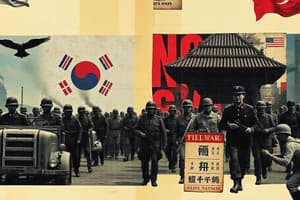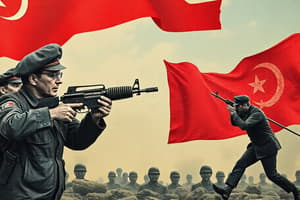Podcast
Questions and Answers
What was the Korean War?
What was the Korean War?
Started on June 25, 1950, when over 90,000 North Korean soldiers crossed the 38th parallel and invaded South Korea.
What were the four stages of the Korean War?
What were the four stages of the Korean War?
- Initial invasion by North Korea 2. UN counterattack at Inchon 3. Chinese counteroffensive 4. Stalemate along the 38th parallel.
What happened following the stalemate in the Korean War?
What happened following the stalemate in the Korean War?
Truman reverted to a policy of containment and MacArthur was fired for disagreement.
What was one cause of the Korean War?
What was one cause of the Korean War?
What was the role of the USA in causing the Korean War?
What was the role of the USA in causing the Korean War?
What role did Kim Il Sung play in the Korean War?
What role did Kim Il Sung play in the Korean War?
What was Stalin's role in the Korean War?
What was Stalin's role in the Korean War?
Flashcards are hidden until you start studying
Study Notes
Overview of the Korean War
- Initiated on June 25, 1950, when over 90,000 North Korean soldiers invaded South Korea by crossing the 38th parallel.
- U.S. President Truman quickly intervened to support South Korea, reinforcing containment policy against communism.
- The United Nations authorized military assistance, leading to an international coalition led by U.S. General Douglas MacArthur, with troops arriving in July 1950.
- Marked a significant global expansion of the Cold War, as U.S. sought to combat communism in Asia.
Stages of the War
- Stage 1: North Korean forces captured most of South Korea, leaving only a small area around Pusan.
- Stage 2: General MacArthur executed a bold amphibious landing at Inchon, reclaiming Seoul and pushing North Koreans back to the 38th parallel.
- Stage 3: Ignoring Chinese warnings, MacArthur advanced toward the Yalu River, provoking a massive counterattack from Chinese and North Korean troops, resulting in U.N. forces retreating.
- Stage 4: The conflict reached a stalemate along the 38th parallel, leading to stagnant front lines.
Aftermath and Policy Changes
- Following the stalemate, Truman shifted back to a strict containment policy, while MacArthur's aggressive strategies led to his dismissal.
- Peace negotiations began in 1951 but fighting continued until the armistice was signed in July 1953.
Causes of the Korean War
- Failure to Unite Korea: Post-WWII agreements led to the temporary division at the 38th parallel. Separate governments emerged with conflicting ideologies, deepening hostility.
- U.S. Role: The withdrawal of U.S. troops post-1948 and Dean Acheson's declaration in early 1950 resulted in a power vacuum, emboldening North Korea under Kim Il Sung to attack.
- Kim Il Sung's Role: Persistently lobbied for Soviet support to invade the South, ultimately receiving approval from Stalin.
- Stalin's Influence: Although not the primary instigator, Stalin’s backing of Kim Il Sung was crucial. His motivations included the success of communism in China and concerns over U.S. influence in Asia.
Studying That Suits You
Use AI to generate personalized quizzes and flashcards to suit your learning preferences.




